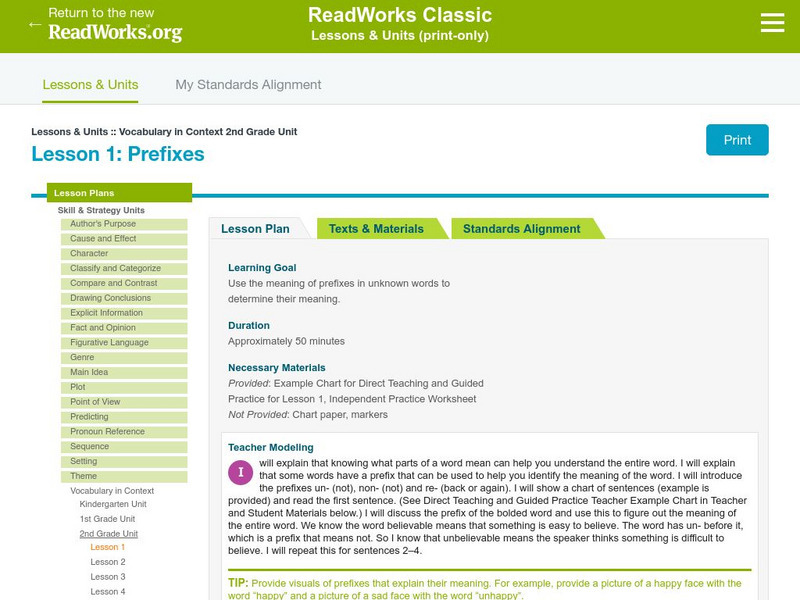Curated OER
Up, Up, and Away
Fifth graders participate in a WebQuest that introduces them to a study on clouds and how they relate to weather systems.
Curated OER
Celebrations
Second graders answer questions after listening to the the story "Celebrating Life Around the World" and verbally identify three ways in which people celebrate special occasions. They then make two verbal connections from their own...
Curated OER
Go Fish
First graders explore rhyming words. They listen to the book One Fish, Two Fish, Red Fish, Blue Fish and discuss the rhyming words. After being placed into groups, they play the game, "Go Fish" and find matching rhyming words. They...
Curated OER
"Math Curse" by Jon Scieszka & Lane Smith
Students use estimation and measurement skills to make predictions and solve problems involving length.
Curated OER
Words in the News: Education Bill Backs India's Poor
Students discuss different groups of people who have been discriminated in the history of the world. They practice using new vocabulary words. In groups, they match the word with its definition.
Hopelink
Hopelink: Reading Lesson Idea: Teaching Word Structure
Understanding word structure and being able to identify root or base words, prefixes and suffixes give your student valuable vocabulary-building skills. Click on the Prefixes and Suffixes handout.
Texas Education Agency
Texas Gateway: Reading: Understand New Vocabulary Using Roots and Affixes
In this lesson, you will learn about two kinds of affixes - prefix and suffix. Prefixes are attached, before a root or base word, and suffixes to the end of a word. You'll learn how all three word parts are keys to unlocking the meanings...
Texas Education Agency
Texas Gateway: Applying Word Study Strategies (English I Reading)
In this lesson, students will practice applying word study strategies to improve your reading fluency and comprehension. L.9-10.5b nuances
Free Reading
Free Reading
This free reading intervention site is geared toward students grade K-3, with literacy activities and lessons/ideas links. The site includes teaching tools and activities. See the link at the bottom to "About FreeReading" for a list of...
ReadWriteThink
Read Write Think: You Can't Spell Prefix Without a Prefix
This online lesson teaches the importance of learning and understanding the meanings of prefixes in the English language. Lesson tend to be interactive, with students identifying, constructing, and defining words with prefixes.
ReadWriteThink
Read Write Think: Improve Comprehension: A Word Game Using Root Words and Affixes
Contains plans for three lessons that teach about root words, prefixes, and suffixes using handouts, websites, and games. In addition to objectives and standards, this instructional plan contains links to sites used in the lessons as...
Texas Education Agency
Texas Gateway: Greek and Latin Affixes (English Iii Reading)
[Accessible by TX Educators. Free Registration/Login Required] In this lesson. You will be introduced to a number of common affixes and roots; play games to practice matching affixes to their meanings; read a passage and use your...
ReadWriteThink
Read Write Think: Flip a Chip: Examining Affixes and Roots to Build Vocabulary
Contains plans for a vocabulary lesson that uses an activity called Flip-a-Chip to teach about affixes. In addition to objectives and standards, this instructional plan contains links to sites used in the lesson as well as assessment and...
Florida Center for Reading Research
Florida Center for Reading Research: Morpheme Structures: Affix Fit
A lesson plan in which students match word cards with appropriate prefixes and suffixes. Materials are included.
Florida Center for Reading Research
Florida Center for Reading Research: Morpheme Structures: Affix Hunt
A lesson plan in which students identify prefixes and suffixes on word cards. Materials are included.
Scholastic
Scholastic: Instructor: Reading Clinic: Strategy Inventory
This lesson plan includes a group of activities that will teach students how to use vocabulary knowledge to help with comprehension of a text. Split into three activities, this lesson plan encourages students to use prior knowledge, word...
Florida Center for Reading Research
Florida Center for Reading Research: Word Parts: Affix Wiz [Pdf]
A lesson plan in which students practice reading a list of affixes and then time each other to see how many affixes they can read in one minute. Students repeat to work towards increased speed and accuracy. Materials are included.
Florida Center for Reading Research
Florida Center for Reading Research: Morphemic Elements: Affix Game
A lesson plan in which young scholars play a game by determining affixes and their meanings in order to move around the board. Materials are included.
Florida Center for Reading Research
Florida Center for Reading Research: Morphemic Elements: Make It Meaningful
A lesson plan in which students sort words based on the meanings of their affixes: before, one who, state or qualify of, and wrongly. Materials are included.
Florida Center for Reading Research
Florida Center for Reading Research: Morphemic Elements: Meaningful Affixes
A lesson plan in which students add affixes to alter the meaning of words. Materials are included.
Florida Center for Reading Research
Florida Center for Reading Research: Morphemic Elements: Affix Concentration
A lesson plan in which students play a memory game by matching affixes with their meanings. Materials are included.
Florida Center for Reading Research
Florida Center for Reading Research: Morphemic Elements: Affix Match
A lesson plan in which students play a memory match game by matching affixes and their meanings. Materials are included.
Read Works
Read Works: Vocabulary in Context 2nd Grade Unit: Prefixes
[Free Registration/Login Required] A lesson in which students learn to use the meanings of prefixes to help determine the meanings of unfamiliar words. Lesson includes directions for direct teaching, guided practice, and independent...
Lumen Learning
Lumen: Rhetorical Reading: Read Strategically: Diversify Your Vocabulary
This lesson focuses on strategies to diversify and retain new vocabularies such as reading a variety of types of writing and learning roots, suffixes, prefixes, and the etymology of words.


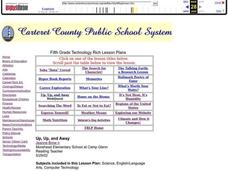






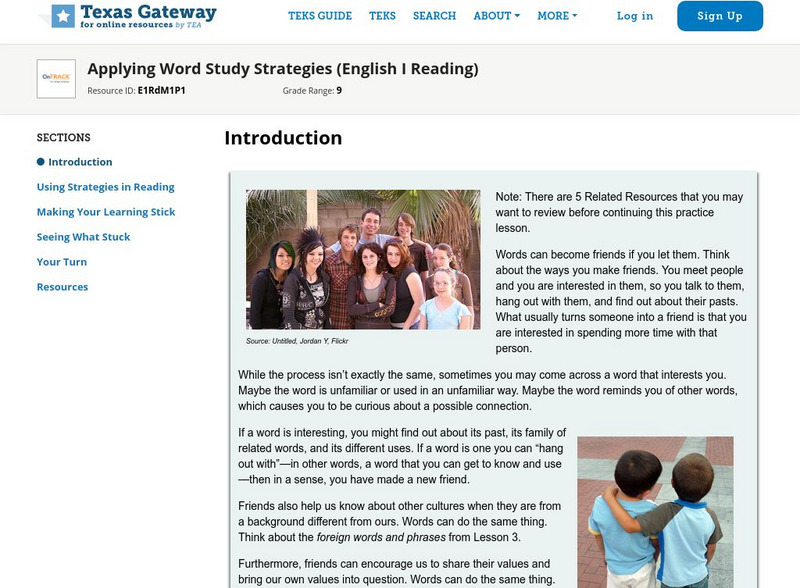
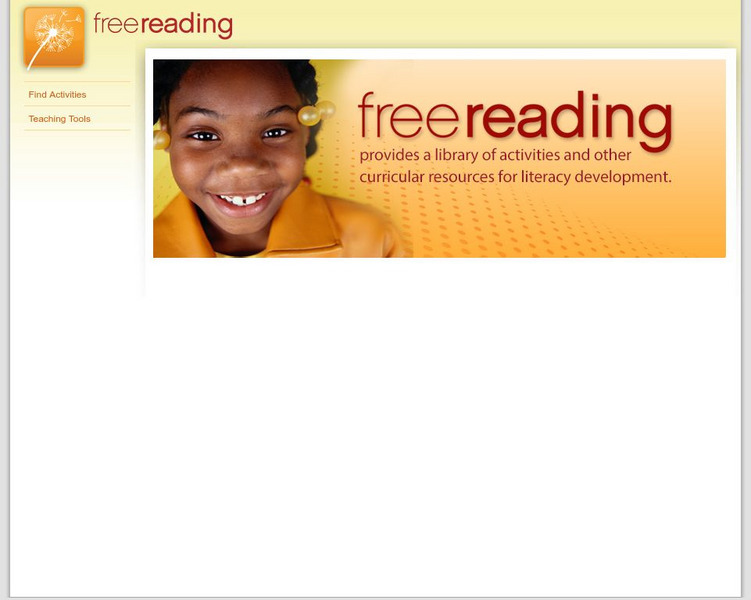


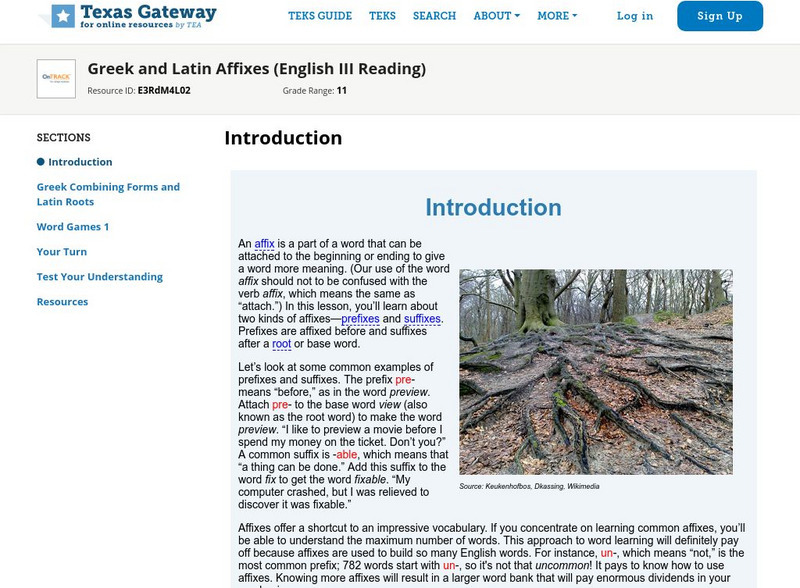
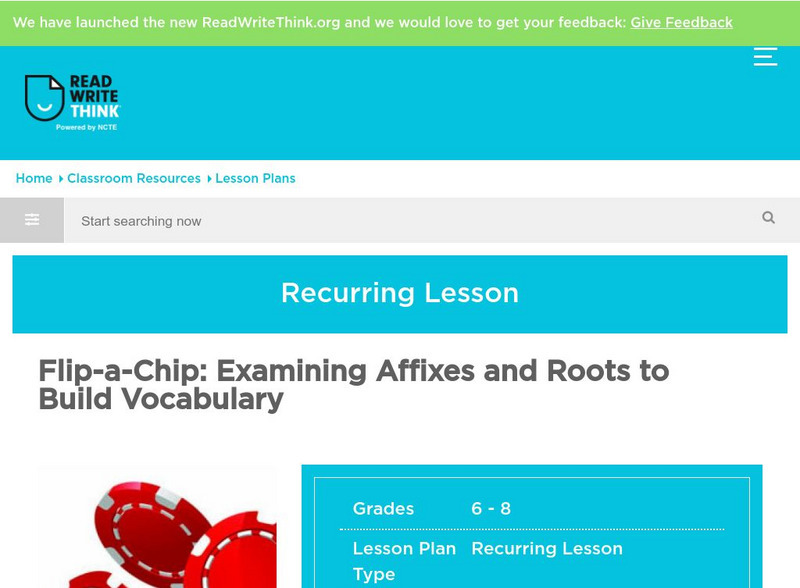



![Florida Center for Reading Research: Word Parts: Affix Wiz [Pdf] Lesson Plan Florida Center for Reading Research: Word Parts: Affix Wiz [Pdf] Lesson Plan](https://content.lessonplanet.com/knovation/original/509139-868fb5e633e23316ff9b58b8fae3370f.jpg?1661800046)





